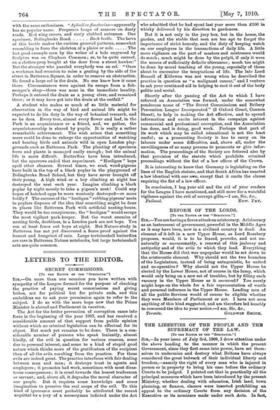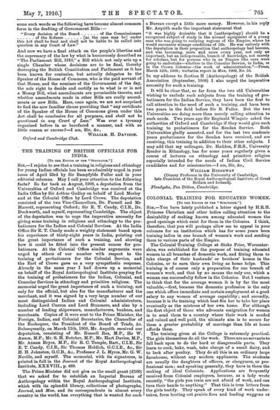THE LIBERTIES OF THE PEOPLE AND THE SUPREMACY OF THE
LAW.
[To THE EDITOR OP THE "SPECTATOR."] SIE4—In your issue of July 3rd, 1909, I drew attention under the above heading to the manner in which the present Government, since they first came into power, have set them- selves to undermine and destroy what Britons have always considered the great bulwark of their individual liberty and freedom,—namely the right of every man who is injured in person or in property to bring his case before the ordinary Courts to be judged. I pointed out that in practically all the principal measures which have been introduced by the present Ministry, whether dealing with education, Irish land, town planning, or finance, clauses were inserted prohibiting an appeal to the ordinary Courts from any decision of the Executive or its nominees made under such Acts. In feet,
some such words as the following have become almost common form in the drafting of Government Bills :—
"Every decision of the Board of the Commissioners
. . . . . . of the Referee [as the case may be] under
this Act shall be final and shall not be liable to be called into question in any Court of Law."
And now we have a final attack on the people's liberties and the supremacy of the law by what is humorously described as "The Parliament Bill, 1910," a Bill which not only sets up a single Chamber whose decisions are to be final, thereby destroying the British Constitution and Parliament as it has been known for centuries, but actually delegates to the Speaker of the House of Commons, who is the paid servant of that House, and the nominee of the Government of the day, the sole right to decide and certify as to what is or is not a Money Bill, what amendments are permissible thereto, and whether amendments made in other Bills are really amend- ments or new Bills. Here, once again, we are not surprised to find the now familiar clause providing that "any certificate of the Speaker of the House of Commons given under this
Act shall be conclusive for all purposes, and shall not be questioned in any Court of Law." Was ever a tyranny organised before in so barefaced a manner, and with so
little reason or excuse F—I am, Sir, &c., Oxford and Cambridge Club.
WILLIAM. H. DAVISON.











































 Previous page
Previous page